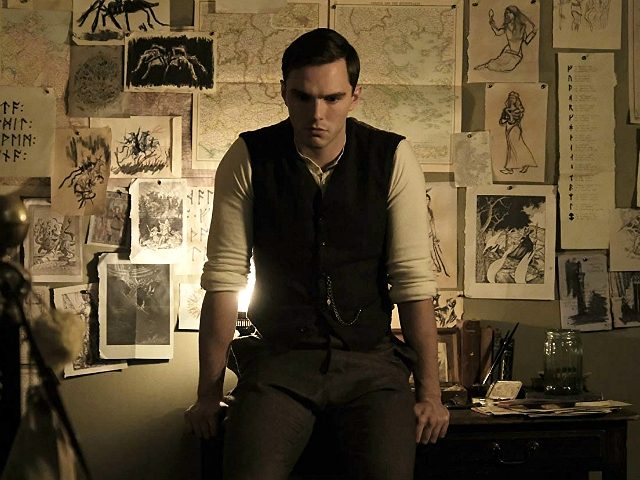According to reports, Disney has done it again and removed the heart and soul from a story because that heart and soul happens to be the Christian faith. This time it is no less than the life story of Lord of the Rings creator J.R.R. Tolkien.
Last May it was Disney’s disastrous adaptation of A Wrinkle in Time, a monumental flop that lost the studio upwards of $100 million. Rather than stick to the Christian themes that make up the foundation of the beloved children’s story, woke director Ana DuVernay’s critical and box office catastrophe — starring no less than Oprah Winfrey, Reese Witherspoon, and Chris Pine — chose instead to embrace identity-politics and all that narcissistic New Age nonsense.
In 2013, Warner Bros. ripped the Christian guts out of civil rights icon Jackie Robinson. Although Robinson and Brooklyn Dodgers owner Branch Rickey were both men of profound faith, the movie seemed embarrassed by this.
Rickey’s Christianity was a guiding force in his momentous decision to change baseball forever by signing a black player to the major leagues, and it was Robinson’s faith that gave him the strength to live through years of racial taunts and hatred until his skills on the field and personal character won the day.
Nevertheless, the biopic 42 was hardly interested.
In 2005, other than a shot of him entering a church, the Johnny Cash biopic Walk the Line whitewashed the Christian faith of both of its subjects: Cash and his wife June Carter Cash. Yes, for a time he was a troubled man, “the biggest sinner of them all,” he once declared, and this is the era the movie covers, but it does so without ever once acknowledging how important Cash’s faith was in pulling him out of his death spiral.
Cash was a serious and accredited biblical scholar, a personal friend to Billy Graham. Cash also wrote a Christian novel, Man in White; recorded a spoken recording of the New Testament and countless gospel albums.
Even so, stripping J.R. R. Tolkien of his Christian faith is even more outrageous. His most famous works are primarily driven by his faith. And for Disney (which owns Fox Searchlight, which produced Tolkien) to pretend otherwise, to completely ignore his religious upbringing as though it was not formative, is a deliberate act of deception.
The Catholic Herald’s pan of Tolkien explains it this way:
This handsome, earnest, yet overstuffed and poorly paced film deviates frequently from the historical record. Most seriously, it ignores Tolkien’s devout Christian faith: there is no indication that he served Mass daily as a boy or ever even entered a Catholic church. His punch-ups with Wiseman and drunken night-time profanities are, in comparison, unimportant inventions.
But departures from reality are inevitable in dramatisations, and enumerating them can quickly devolve into captiousness. What’s more relevant is whether the artistic licence results in a successful story. One expects a biopic to sit somewhat loose to the facts, yet one hopes it will also hold the attention and make one care about the characters, however far from real life they may diverge.
A helpful comparison is Richard Attenborough’s Shadowlands, the story of CS Lewis’s late marriage. It’s worthless as an account of actual events, but works brilliantly as a movie: engaging, well-structured, powerful and poignant.
For the record, Shadowlands is a lovely film that doesn’t shy away from Lewis’s faith, it just misleads us into believing Lewis, a reformed atheist and Christian apologist, never managed to fully embrace his faith again after the untimely death of his wife, when the exact opposite is true.
Shadowlands practically turns God into the movie’s villain, and while it quotes Lewis’s heart-wrenching examination of his grief in A Grief Observed, it ignores the overall point of that magnificent confessional, one that concludes that grief is God’s way of bringing us closer to Him.
Of Tolkien’s faith and the biopic, Pajamas Media’s Tyler O’Neil writes:
Worst, however, is the film’s neglect for Tolkien’s faith, which inspired his entire life. The movie also cuts out the literary works that inspired his imagination — touchstones of the Western literary tradition. In fact, the author’s literary masterpiece The Lord of the Rings is heavily influenced not just by the Western literary tradition but by Christianity and Jesus in particular.
O’Neil also spoke to Joseph Loconte, Ph.D., who recently wrote a Tolkien biography and felt a huge hole in the biopic:
Serious Tolkien fans might wonder why the film offers no hint of another vital influence: his friendship with Christian author and apologist C.S. Lewis. But Karukoski wanted to explore the earliest events and experiences that helped shape Tolkien’s astonishing imagination, and Lewis arrives later, in post-war Oxford. The story of Lewis, Tolkien, and the Inklings—the circle of Christian authors and friends who met weekly to discuss literature, faith, and other weighty topics—deserves its own film treatment.
…
Tolkien’s Christian faith is another great factor in his life and career, a force that animates all of his creative energies. Orphaned as a teenager, Tolkien came under the care of a Catholic priest, who is portrayed sympathetically in the film. Yet there is no hint that Tolkien possessed a faith of his own, or that it was a source of strength and comfort during the tragedy of the war.
In fact, Tolkien was a regular churchgoer, and even attended Mass whenever he could while a soldier at the Western Front. In explaining the power of myths to grip our imagination, Tolkien spoke of the eucatastrophe—the reversal of a catastrophe through ‘a sudden and miraculous grace.’
More proof that Hollywood hates us; hates Christians, hates Christianity — even Disney, for crying out loud.
Follow John Nolte on Twitter @NolteNC. Follow his Facebook Page here.

COMMENTS
Please let us know if you're having issues with commenting.